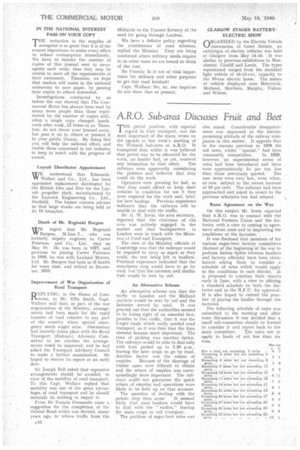A.R.O. Sub-area Discusses Fruit and Beet T "petrol position, with especial
Page 18

If you've noticed an error in this article please click here to report it so we can fix it.
regard to fruit transport, was the most important of the many items on the agenda at last week's meeting of the Wisbech Sub-area of A.R.O. It transpired that whilst it was believed that petrol was to be allocated for the work, no haulier had, as yet, received
any intimation to that effect. The railways were apparently considering the position and believed that they could do the work.
Operators were pressing for fuel, so that they could afford to keep their vehicles in condition for use if they were required for the work and, later, for beet haulage. Previous experience indicates that the railways will be unable to deal with the traffic.
Mr. G. W. Irwin, the area secretary, reported that the chairman of the area was actively engaged in the matter and that headquarters in London were in touch with the Ministers of Food and Transport. The view of the Ministry officials in Cambridge was that the railways would be required to carry as much as they could, the rest being left to hauliers. Practical experience indicated that the strawberry crop would have to go by road, but that the currants and similar fruit would be sent by rail.
An Alternative Scheme An alternative scheme was that the traffic to London and the Midland marktts would be sent by rail and the
factories served by road. It was poir.ted out that the authorities seemed to be losing sight of an essential fact, peculiar to this traffic, that it was the longer hauls which really needed road transport, as it was then that the time element became more important. The time of picking was another factor. The railways would be able to deal only with fruit picked up to 3.30 p.m., leaving the later crops to go by road. Another factor was the return of empties. Because of the shortage of timber cases were difficult to obtain and the return of empties was correspondingly more important. The railways could not guarantee the quick return of empties and operations were likely to be held up on that account. The question of dealing with the potato crop then arose. It seemed likely that road hauliers would have to deal with the " earlies," leaving the main crops to rail transport.
The problem of sugar-beet rates was also raised. Considerable disappointment was expressed at the uncompromising attitude of the railway companies in this matter. It appears that in the seasons previous to 1939 the rail rates, whilst "special," had been reasonably competitive. In 1939, however, an experimental series of rates had been introduced and these were approximately is. per ton less than those previously quoted. The new rates were very low, even when, as now, subject to the recent increase of 10 per cent, The railways had been approached and asked to revert to the previous schedules but had refused.
Rates Agreement on the Way On this subject Mr. Irwin reported that A.R.O. was in contact with the National Farmers Union and the factories, with a view to coming to agreement about rates and to improving the conditions at the factories.
It was disclosed that members of the various sugar-beet factory committees (formed at the beginning of the war to perform liaison duties between hauliers and factory officials) have been circularized asking them to consider a schedule of rates which would apply to the conditions in each district. It is proposed to combine their reports early in June, with a view to offering a standard schedule to both the factories and to the N.F.U. for approval. It is also hoped to extend the practice of paying the haulier through the factories.
The following schedule of rates was submitted to the meeting and after some discussion it was decided that a small sub-committee should be formed to consider it and report back to the
main committee. The rates are to apply to loads of not less than six tons.




















































